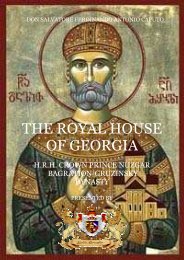here - Nobility Associations
here - Nobility Associations
here - Nobility Associations
You also want an ePaper? Increase the reach of your titles
YUMPU automatically turns print PDFs into web optimized ePapers that Google loves.
to him at all, for Europe has always belonged to the Church. In an encyclical<br />
published shortly after the close of the Council of Lyons in 1245, Innocent expressly<br />
stated: "It is wrong to show ignorance of the origin of things and to imagine that<br />
the Apostolic See's rule over secular matters dates only from Constantine. Before<br />
him this power was already in the Holy See. Constantine merely resigned into the<br />
hands of the Church a power which he used without right when he was outside<br />
her pale. Once admitted into the Church, he obtained, by the concession of the<br />
Vicar of Christ, authority which only then became legitimate. "<br />
Furthermore, Pope Innocent stated that the pope's acceptance of the Constantine<br />
Donation was but a visible sign of his sovereign dominion over the whole word, and<br />
hence of all the wealth to be found on earth.<br />
However, Pope Innocent IV is probably best known for his diplomatic and military<br />
battles against Frederick II which ultimately led to the demise of the Holy Roman<br />
Emperor.<br />
CONRAD IV<br />
The son of Emperor Frederick II and his second wife,<br />
Isabella (Yolande) de Brienne, Conrad was heir to the<br />
Kingdom of Jerusalem through his mother; he was also<br />
invested by his father as duke of Swabia in 1235. At<br />
Vienna in February 1237 he was elected king of the<br />
Romans in place of his half-brother, Henry VII, who<br />
had rebelled against the Emperor in 1235. After Pope<br />
Gregory IX excommunicated Frederick II in 1239,<br />
Conrad was opposed by a growing papal party in<br />
Germany, led by the Archbishops Siegfried of Mainz<br />
and Conrad of Cologne. In 1245 Pope Innocent IV<br />
declared both Conrad and his father deposed and<br />
proclaimed a crusade against them. On Aug. 5, 1246,<br />
Conrad was defeated near Frankfurt by the antiking Henry Raspe. He continued to<br />
be supported, however, by the towns and by Otto II of Bavaria, whose daughter<br />
Isabella he married on Sept. 1, 1246. On Dec. 13, 1250, Frederick II died. Troubles<br />
in Sicily and the rising strength of the papal party in Germany under Henry Raspe’s<br />
successor, William of Holland, forced Conrad to abandon Germany for Sicily late in<br />
1251, when he took the title of king of Sicily. Conrad’s position in Sicily was secured<br />
by his capture of Naples in October 1253, but his efforts to reach an understanding<br />
with the papacy failed<br />
After the death of his father Frederick II, Conrad IV (born April 25, 1228, Andria,<br />
Italy—died May 21, 1254, Lavelle, German king from 1237 and king of Sicily from<br />
1251) for some time (uncle to Corrado Caputo of Antioch), continued to fight<br />
The Hohenstaufen Dynasty - Page 77 of 200



